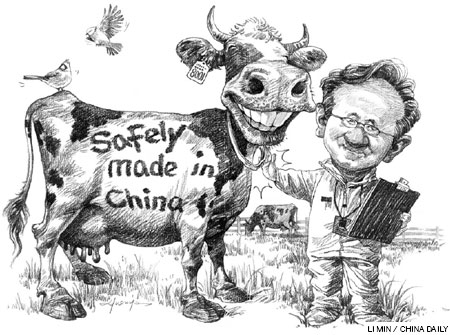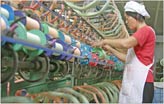Delicacies
Milking the market
Updated: 2011-06-12 08:43
By Pauline D Loh (China Daily)

Going abroad? Don't let any friends with kids know, or you may end up coming back with a suitcase stuffed with baby formula. Pauline D Loh looks at this unusual phenomenon.
My colleague came back from Hong Kong recently with a strange tale. He was glared at ferociously while he was in the checkout line of a supermarket in North Point's Taikooshing Mall.
The reason? His friends were buying dozens of tins of milk powder, and the supermarket staff were bordering on hostile, fearful that it signaled yet another buying spree that would clear their shelves of baby formula.
Sadly, it's true, and common. Chinese mainland parents, wary of locally produced milk powder, are going to Hong Kong and Macao to stock up on imported baby formula, and creating a demand that suppliers cannot cope with. And if they cannot travel, they will not hesitate to pressure friends into bringing back the milk powder for them.
As a result, parents in the special administrative regions, too, are stockpiling, just in case supplies run out.
Chinese mainland parents are caught in a dilemma of trust. Just as they were getting over the melamine scare of 2008, new reports this year in February again exposed the presence of melamine in infant formula.
While the authorities have been quick to crack down on the miscreants, hard-earned confidence had been dealt another blow, much like a fresh cut on a barely-closed wound.
In a country with a one-child policy, you can be sure no one will risk the health and well-being of their only progeny, if they can afford it. And parents do pay a hefty price for peace of mind.
Imported milk powder is not cheap; it costs anything from 150 to 200 yuan ($23-31) for an 850g tin. It may mean that the youngest member in the family will likely drink up half of one parent's pay packet each month - and we are not even counting the other daily paraphernalia needed to nurture the modern Chinese infant.
Some parents are resorting to surrogate buyers online, and these charge an even higher price. There are more than 10,000 listings for such agents on the popular taobao.com, for milk powder imported from the Netherlands, Australia, the United States and New Zealand.
If Chinese parents are slow to trust locally produced milk products, New Zealand's top dairy exporter Fonterra is quick to recognize the potential growth. In 2008, the group helped exposed the use of melamine in milk, although its joint-venture partner Sanlu was implicated in the process. But Fonterra is unfazed by the setback.
In a recent interview with Financial Times, its CEO estimates that China's dairy market will rise from about $25 billion to $72 billion by the end of this decade. Rising incomes and growing populations - and ironically, a wariness of inferior products born of the melamine scandal - are fueling the demand for top-quality milk. Fonterra is so confident that it is already setting up a series of dairy farms in China's Hebei province.
China is not a traditional dairy producer, and the Chinese are not traditional dairy consumers apart from ethnic pockets in the north of the country. A lot of education is needed - both for smallholder producers that supply dairy factories and for the downstream consumers.
It is a steep learning curve, and a slow learning process. It is, however, an essential step as the country zooms into position as the world's top consumer market.
The solution? Stricter controls and a painstaking and persistent effort to drill the message into dairy producers that shortcuts that feed avarice, greed and temporary gain only lead to a dead end. And in China, that may well mean a death sentence under the current food safety laws.
Specials

Wealth of difference
Rich coastal areas offer contrasting ways of dealing with country's development

Seal of approval
The dying tradition of seal engraving has now become a UNIVERSITY major

Making perfect horse sense
Riding horses to work may be the clean, green answer to frustrated car owners in traffic-trapped cities